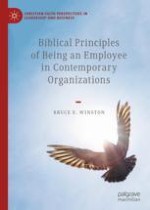2019 | OriginalPaper | Buchkapitel
7. Sabbath, Selah, and Fallow Ground: God’s Design to Keep Our Focus on Him
verfasst von : Bruce E. Winston
Erschienen in: Biblical Principles of Being an Employee in Contemporary Organizations
Aktivieren Sie unsere intelligente Suche, um passende Fachinhalte oder Patente zu finden.
Wählen Sie Textabschnitte aus um mit Künstlicher Intelligenz passenden Patente zu finden. powered by
Markieren Sie Textabschnitte, um KI-gestützt weitere passende Inhalte zu finden. powered by
